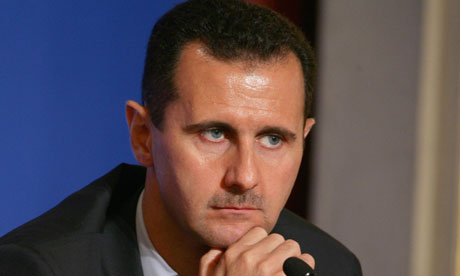Documents leaked by Syrian defector show that Assad personally signs off security crackdown plans
Ian Black, Middle East editor
guardian.co.uk,

Leaked papers show Syrian president Bashar al-Assad is personally involved in approving measures to crush the unrest. Photograph: Benaious/Hounsfield
Leaks of what appear to be official Syrian documents reveal how its president, Bashar al-Assad, personally signs off plans drawn up by his government's crisis management centre, prioritising a security crackdown to prevent protests against his regime spreading to Damascus.
Hundreds of pages of confidential papers shown to al-Jazeera TV by a defector describe daily meetings of the heads of all Syria's security and intelligence agencies, who review events and issue orders that are then approved by the president.
The Interfax news agency also reported that a Russian military anti-terror unit had arrived in the Syrian port of Tartous aboard a tanker from the country's Black Sea fleet. The tanker had earlier passed through pirate-infested waters.
The troops arrived as the Russian government backed a call by the Red Cross for daily two-hour ceasefires to allow for aid to reach the areas worst hit by violence.
Amid reports of fighting on Monday in the Mezzeh area of Damascus – the heaviest in the capital since the uprising began a year ago – al-Jazeera said the documents were smuggled out of Syria by Abdel-Majid Barakat, head of information for the state crisis management unit, who is now hiding in Turkey with opposition activists.
Emails published by the Guardian last week, which were also obtained from Syrian opposition sources, showed the gilded lifestyle of Assad and his wife Asma, apparently insulated from the bloodshed and violence raging across the country.
The emails included details of iTunes purchases, flirtatious exchanges with a female aide, and advice on PR and media policy.
The latest documents appear to shed more direct light on the regime's strategy against the uprising, including the deployment of thousands of militia known as "shabiha" and Ba'ath party members in operations designed to cut off Damascus, Aleppo, Idlib and other large cities from surrounding regions.
In the capital, the documents show, the main squares are the responsibility of different branches of Syria's large security apparatus, including the notorious air force intelligence directorate, which has been repeatedly accused of brutality and torture by Syrian opposition supporters and foreign human rights watchdogs.
On Fridays, the day of the biggest anti-regime protests since the uprising began, the plan is to isolate the capital using 35 checkpoints to control movement. Roads into Damascus from nearby towns are routinely closed and 1,000 security staff are deployed in the central Ummayad mosque alone.
Al-Jazeera said the papers made clear that Assad was personally involved in approving measures to crush the unrest. His signature was visible on one document authorising prison sentences for illegal demonstrations.
In one leaked document marked confidential, the government warned the foreign minister about countries trying to persuade Syrian diplomats to defect.
Al-Jazeera said: "Every evening at 7pm Damascus time, there is a meeting of all the intelligence and security chiefs looking back at what happened across the country during the day, making their plans, making their orders for the next day. These plans go to the office of the president the next morning and he himself signs all the orders, gives the final go ahead."
Al-Jazeera described Barakat as an opposition "mole" inside the HQ directing the crackdown, who realised last month that he had been compromised and fled the country with 1,400 documents, which the TV station believes are genuine.
"My mission was to transfer the information to the opposition internally and abroad," Barakat said in an interview with the Qatar-based satellite channel, which is considered profoundly hostile by the Assad regime.
"Anyone who reads these reports will be shocked, will realise that Syria is living a real crisis: killings, criminality and suppression of protesters. However security chiefs paint [a] beautiful picture in their reports. They ignore many substantial facts on the ground simply to boost the president's morale."
The Syrian government made no comment on the documents.
Syrian state TV said three "terrorists" and member of the security forces had been killed in the Damascus fighting.
Heavy machine-gunfire and rocket-propelled grenades echoed throughout the night from the western suburb of Mezzeh, one of the most heavily guarded areas of the capital.
The Revolution Leadership Council of Damascus also reported 35 people had been injured by gunfire in the Barzeh area.
UN experts and the Arab League envoy Kofi Annan arrived in Syria on Monday to discuss ceasefire and monitoring plans.
Tartous is now the only naval base Russia has outside the former Soviet Union. A Russian navy squadron made a call there in January in what was seen by many as a show of Moscow's support for Syrian President Bashar Assad.
Russia has shielded Syria from UN sanctions over Assad's yearlong crackdown on the uprising, in which according to the UN more than 8,000 people have died.
http://www.guardian.co.uk/world/2012/mar/19/syria-leaked-document-assads-role?newsfeed=true
http://samotalis.blogspot.com/
No comments:
Post a Comment